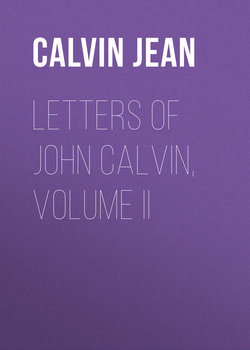Читать книгу Letters of John Calvin, Volume II - Calvin Jean, Jean Calvin - Страница 63
CCVI. – To Monsieur de Falais
ОглавлениеDedication of the Apology – mention of M. de Montmor – Sickness of Maldonado
From Geneva, this 10th of September 1547.
Monseigneur, – By your last, I perceive, that I have not yet satisfied you concerning the Apology. Although the three points which you have noted need not retard the publication, the excuse may be made in three sentences; because should we enter somewhat further on explanation, we must touch upon rather ticklish matters, which it would be better to let sleep. I do not know to whom it would be well to address it at present, considering the temper of the times. She has already played a principal part: I cannot think of any of the other persons who would be suitable. To dedicate it to the noblesse of the Netherlands, would be a hateful proceeding. In Germany, what states would you choose? I would therefore prefer that no change be made in the beginning. Touching the conclusion, although there is plenty of material, and that very pertinent, that might be added, even as it stands it is not incomplete. Hereafter, should occasion call for it, you will consider whether you should add thereto, or make some other distinct publication. However, I refer the whole to your discretion, and merely express to you my opinion.
Concerning the party you inquire about, I fear that you suppose I build marriages in the air very much at random. But why so? for indeed I believe that I have some foundation of reason and sound confidence. Eight months ago, the son of M. de Montmor, with whom I was brought up in my childhood,170 informed me that he would desire above all else to retire hither, and he continues of that mind; for it is not merely on one occasion that he has so written. He is a young man; at least he is of the age of thirty-four years, good-natured, very gentle, and docile. Though he has drunk deep of youthful follies in earlier life, now that God has given him a knowledge of himself, I believe he will be quite to your mind. I have made diligent inquiry of Nicolas Loser, and Nicolas Picot his son-in-law, who have spoken to him, whether there was any taint of disease about him, such as young men acquire in their dissolute courses. They have replied to me in the negative. My desire has thereupon led me to build an expectation. Should he come, as I expect, I would send him at once to yourself; and then you can consider whether he would be a suitable person. If he does not come within a mouth, I know not whether I ought to expect him. But I think he will come, to communicate to me, and forthwith return to expedite his departure.
We have been like to lose the good Maldonado, for he has been at the point of death: and the fever even now confines him to bed, but not with imminent danger, so far as we can discern, by the favour of God. I have prepared some verjuice, enough for a year's provision, which awaits you, if perchance you come. It is the produce which you have got from your garden for the bygone year.
In conclusion, Monsieur, having humbly commended me to your kind favour, and that of Madame, I pray our good Lord to have both of you in his holy protection, to lead and direct you, to send you whatsoever he perceives to be needful for you.
Your servant and humble brother,
John Calvin.
[Fr. orig. autogr. – Library of Geneva. Vol. 194.]
The title would appear to me to read well thus: Excuse composed by M. Jacques de Bourgoigne, &c., to clear himself towards his Imperial Majesty from the calumnies laid upon him on account of his faith, whereof he makes confession. For the word Apology is not used in French.
170
We read in the Life of Calvin by Theodore Beza, "From his youth he was all the better, and liberally brought up, – at the expense of his father, however – in the society of the children of the house of Montmor, whom he also accompanied as the companion of their studies at Paris." It is to one of the members of that noble family, Claude de Hangest, Abbot of Saint Eley, that Calvin dedicated, in 1532, his Commentary on Seneca's Treatise De Clementia.
